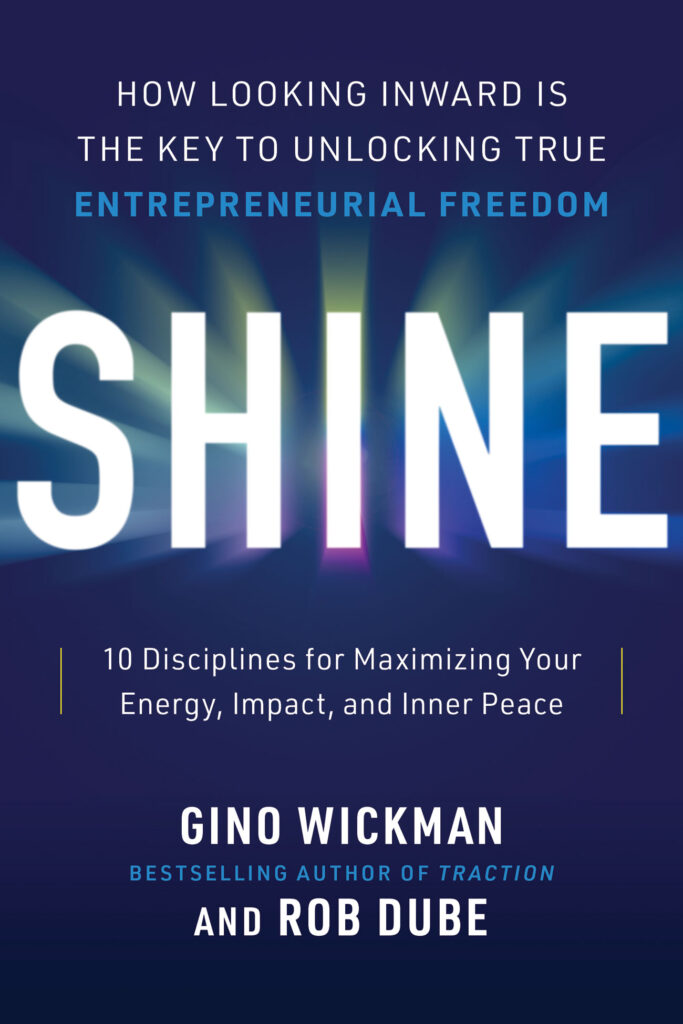This excerpt is shared with permission from Shine: How Looking Inward Is the Key to Unlocking True Entrepreneurial Freedom by Gino Wickman and Rob Dube (BenBella Books, 2024).
Here are a few of the activities that past clients proudly share with us when they return from vacation. “I cleared out all of my emails!” “I read the latest business book!” “I finally caught up on all the industry and business news!”
That’s not a vacation. That’s not time off.
We intuitively know we should take time off from our work lives, but in our connected world, it rarely happens. You can’t go, go, go all the time. You have to turn your brain off. As Stephen Covey said, “You have to ‘sharpen the saw.’” Put another way, you have to stop and refill your tank.
Recently, [Shine’s co-author] Rob was having a conversation with a driven entrepreneur. She eagerly shared with him that she had not taken a vacation in more than three years, saying, “I love my work, and there is nothing else I would rather be doing.”
She is not the only person we’ve heard that from over the years, only to later hear how they went so hard that they burned themselves out. Maybe you are the unicorn in this world who works all the time, has no hobbies or outside interests and has people in your life who love you, don’t mind that you aren’t spending time with them or that when you do, you aren’t fully present. We have yet to meet that unicorn.
You must work hard and play hard. Unplug from work, turn your brain off and recharge your batteries.
Why you should take time off according to Shine authors Gino Wickman and Rob Dube

I take 150 days off per year, which includes a sabbatical for the entire month of August. I’ve done it for more than 20 years, and I’m convinced I’m further ahead because of it. When I return from time off, I get more done, have more energy and have more creative ideas that make an impact. And now that I’ve “shed many layers,” I am much more present with my loved ones when I take time off, which has led to much better relationships.
I’ve been able to do all of that because I take time off. You have to allow time away from work in order to create clarity and space to do the work.
Plus, when you unplug and then come back to the business, you view problems differently… more clearly, almost from an outside perspective. As the old adage teaches us, “When I go slow, I go fast.”
You can’t have your foot on the accelerator all the time and expect to shed layers and find peace. If you are going nonstop, you are hiding behind your work. You are numbing your pain.
The pushback
Entrepreneurs often push back by saying, “I can’t take time off,” “I don’t like to take time off” or “That’s not how I work.” Some people just don’t know how to turn it off. They’re incapable of taking a break. They need to work. They feel like they’re supposed to be working.
Please understand that is a disorder. Remember, most driven people have a work addiction—they are workaholics. They are numbing themselves with busyness.
When you take your foot off the gas pedal, the healing begins.
It’s like the necessary one-to-two hours of deep sleep we need each night—the most restorative stage—when your brainwaves, heartbeat and breathing slow down. Your blood pressure drops and your muscles relax. This stage of sleep improves memory and learning and produces growth hormones. Your energy is restored, your cells are regenerated and your immune system is strengthened. All because you stopped and slept.
Imagine if you didn’t get enough deep sleep. It’s the same as working all the time. You deprive yourself of the many benefits going on under the surface that you can’t see. Stopping starts the healing process and creates the opening for the subconscious ideas bubbling inside you to come to light.
Workaholism is a disease—but it’s curable
One of our clients was a workaholic, and as she made her way through The 10 Disciplines [principles outlined in Shine to help readers keep from burning out, she began to realize it. Awareness is the first step. As she worked on this Discipline, she boldly committed to taking two extended vacations and not thinking about work the entire time. Both entailed traveling: a 10-day trip to Costa Rica and a three-week stay in India.
While in Costa Rica, she noticed that after three days she began to feel extremely uncomfortable. After the excitement of arriving and getting settled had passed, she didn’t know what to do. She tried to get into a routine but felt the pull to check her email, read a business book or even call the office. Thankfully, she did not do any of those things. We should note that she did let her team know prior to the trip that she would not be checking email or calling in—she would be completely unavailable. Being a driven entrepreneur, she did not want to fail at her personal challenge to turn it all off.
The discomfort she was experiencing was a form of work-life detox. It lasted two more days, and then she began to hit her stride. As her mind and body began to settle, she started seeing the world more vividly—the sights, smells, tastes and sensations of an exotic land. She realized that the uncomfortable feeling was opening up space for her to work on her inner world: freeing her mind, unshackling herself from her ego and bringing her closer to her true self.
The benefits of time off are immense
For some, taking time off can seem unproductive. They feel that not being at work is the perfect time to catch up and think about work. Yet that is just another form of everyday work clutter. Committing to taking time off and not thinking about work opens up space in your mind and body. With this space, you will have the freedom to do the inner-world work—the most rewarding work you will do.
Imagine a time in your life when you had a clear mind and a rejuvenated body. This feeling is available to you whenever you want. Taking breaks will help you begin to float when you get back to work. You will be more productive, creative, rested, clear and impactful.
A client of ours, Denver Nguyen, the CEO of Wayfynder, which provides corporate coaching, took two weeks off without thinking about work the entire time. He shared, jokingly, that it was very hard, comparing it to meditation but expanded for two weeks.
Denver’s time off provided him the space for his mind to roam, which sparked his creativity. As he became more in tune, he wondered, “What does my soul want to express? What is my unique creation?”
The time away provided him with the clarity to change the vision for the company. Its vision originally was to “democratize access to coaching to all levels.” This vacation led him to implement a new and inspiring vision: to “make self-actualization at work commonplace”—that is, Wayfynder wants to teach the working world that they can bring their true selves to the workplace.
Photo by Peera_stockfoto/Shutterstock.com






